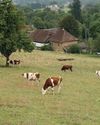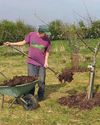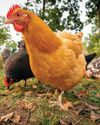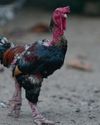
So far in this series we've explained why breeding using broody hens to incubate, hatch, and raise chicks is a viable model for the smallholder and guided you through how best to prepare to maximise your hatch rates. In this third instalment we'll share our tips from our many years of experience with broody hens to support the incubation period.
IS MY HEN BROODY?
This may sound like a strange question to ask, but recognising a broody hen is not always straightforward. Every hen is different and they do have a mind of their own.
It has to be said that waiting for a hen to brood is like waiting for a kettle to boil.
A hen will brood in her own time but there are some signs we look out for:
• She won't leave the nest
• When we open the nest box she'll puff up and make a noise that we call "eagle chicken". Trust us, when you hear it, you'll know it!
• It's possible that she may try to bite us if we put our hand on her
• She will have flattened her body to cover as much space in the nest as possible
• She will stop laying although we may find eggs for the first two or three days
Once we are convinced our hen is broody, we can set up her nest.
SETTING UP THE NEST
In our last instalment we explained the importance of giving our broody hens their own coop and run for the duration of the brood. The first thing we do is to relocate our broody hens into their own personal suite. Sometimes the hen changes her mind when she's moved so we have a little routine before we give our hens fertilised eggs to incubate.
この記事は The Country Smallholder の April 2023 版に掲載されています。
7 日間の Magzter GOLD 無料トライアルを開始して、何千もの厳選されたプレミアム ストーリー、9,000 以上の雑誌や新聞にアクセスしてください。
すでに購読者です ? サインイン
この記事は The Country Smallholder の April 2023 版に掲載されています。
7 日間の Magzter GOLD 無料トライアルを開始して、何千もの厳選されたプレミアム ストーリー、9,000 以上の雑誌や新聞にアクセスしてください。
すでに購読者です? サインイン

How to Buy a Smallholding in France- Long-time smallholder Lorraine Turnbull looks at the practicalities of moving to rural France
Aspiring smallholders are continually thwarted by the prices of smallholdings and property with land located within the UK. Even the humblest croft in Scotland comes with a substantial price tag and conditions which would make even an adventurous wannabee consider carefully. But all is not lost. For those willing to take the adventure of a lifetime, there is always Europe, and one of the most popular places is France.

Meet the Bournemouth goats and their supporters
These capricious animals are hard workers preserving the natural habitat

Still warm enough to sit outside with a Pizza
Henrietta Balcon uses fresh figs to create an unusual dish at Harvest time

Goodbye to the birds of spring and summer
If you look and listen you might be able to see them preparing to leave says The RSPB

Get ready for the colder weather in the warmth of late summer
Claire Waring advises on doing the best to make sure your colonies survive until next spring

Preparing the Veg Patch for Winter
Lee Senior says, a well-run plot can excitingly continue to produce good quality, tasty, fresh food for much of winter

Time to prepare to plant your orchard
Wade Muggleton, smallholder and author of The Orchard Book, shares his practical experience so you can create your own fruit collection

Choosing feed for the autumn
As autumn approaches, Joanna Palmer, nutritionist at the Smallholder Range, offers advice on choosing the right feed to support your adult birds through their annual moult and ensure your young birds grow and finish well at this time of the year.

Vet advice from an experienced poultry vet
Reflecting on how much the humble hen has helped people world wide plus advice on stopping the scourge of red mite

Give your hens some support
Paul Donovan looks at the right and wrong ways of handling birds